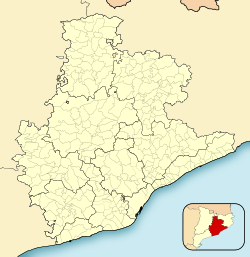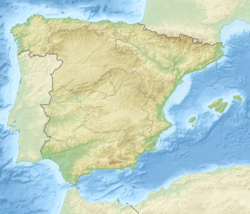Barcelona
Barcelona
Muscab | |
|---|---|
 | |
|
| |
| Nicknames: | |
| Coordinates: 41°23′N 2°11′E / 41.383°N 2.183°E | |
| Country | |
| Autonomous community | |
| Province | Barcelona |
| Comarca | Barcelonès |
| Districts | |
| Government | |
| • Type | Ayuntamiento |
| • Body | Ajuntament de Barcelona |
| • Mayor | Jaume Collboni (Socialists' Party of Catalonia) |
| Area | |
| • City | 101.4 km2 (39.2 sq mi) |
| Elevation (AMSL) | 12 m (39 ft) |
| Population (2018)[3] | |
| • City | 1,620,343 |
| • Rank | 2nd |
| • Density | 16,000/km2 (41,000/sq mi) |
| • Urban | 4,840,000[2] |
| • Metro | 5,474,482 |
| Demonyms | Barcelonan, Barcelonian barceloní, -ina (Catalan) barcelonés, -esa (Spanish) |
| Postal code | 080xx |
| Area code | +34 (E) 93 (B) |
| INE code | 08 0193 |
| City budget (2014) | €2.6 billion[4] |
| Official language | Catalan and Spanish |
| Main festivity | La Mercè |
| Patron saint | Eulalia of Barcelona |
| Website | www |
Barcelona is the capital city of Catalonia, which is a region of Spain. Barcelona is the largest city on the Mediterranean coast. The city is between the rivers of Llobregat and Besòs, and south of the Pyrenees mountains. It has a humid subtropical climate (Cfa in the Köppen climate classification). Most rain falls in autumn and spring, and the least rain falls in winter and summer. The average rainfall is relatively low, due to the rain shadow from the mountains.
In 1992, Barcelona hosted the Summer Olympic Games. Many new parks were opened and other significant changes to the city were made. One example is opening the new beaches in the Poble Nou area.
In 2007, about 1.6 million people lived in Barcelona. Around 3.1 million people live in the Metropolitan Area and 4.9 million people live in the Urban Region. Barcelona is the second most populated city in Spain, and the tenth in the European Union.
Barcelona is home to football team F.C. Barcelona.
History
[change | change source]The origin of Barcelona is unclear. The ruins of an early settlement have been found dating to earlier than 5000 BC.[5]


During the Roman Empire, Barcelona was a colony of the Western Roman Empire called Barcino (full name was Colonia Faventia Julia Augusta Pia Barcino). A clear example of the Roman heritage in Barcelona is the preserved Barri Gòtic (Gothic Quarter) in the center of city.
In the Middle Age (5th century), Barcelona was conquered by the Visigoths. King Athaulf moved his capital here for a short time. In 511, a battle between the Ostrogoths and Visigoths took place near the city in which the Ostrogoths won.
In 8 century, Barcelona was conquered by the Moors.
Until the 15th century, Barcelona was the leading slave trade centre. [6] Barcelona was a centre of Catalan separatism for a long time.
During the Spanish Civil War, Barcelona was Republican city.
Culture
[change | change source]Barcelona's culture roots go back 2000 years.
The city is very religious, so there are many cathedrals in it. The most famous of them is Sagrada Familia. Barcelona Cathedral is also popular among the tourists.
Barcelona has a large number of theaters such as Palau de la Música Catalana, Liceu etc. Barcelona has an symphony orchestra.
There are also many museums. For example, Museu Nacional d'Art, Museu Picasso, Museu Marítim, Museu d Història de la Ciutat Barcelona, Museu d’Art Contemporani de Barcelona and Museu de la Xocolata.
The street called La Rambla is a place for street performances such as mime performances. The Sonar Festival and Primavera Sound Festival are two major pop music festivals that take place yearly there.
Barcelona has one of Europe's largest aquariums – Aquarium Barcelona.
El Periódico de Catalunya, La Vanguardia and Ara are three major newspapers of Barcelona.
Many popular films were also shot in Barcelona. The examples are Todo sobre mi madre (1999) by Pedro Almodóvar, REC (2007), Salvador (2006), Vicky Christina Barcelona (2008), Biutiful (2010), Tres metros sobre el cielo. Tengo ganas de ti (2012).
Economics
[change | change source]Barcelona was for a long time an industrial city. Currently, factories have been moved to the periphery, a fact that has allowed to transform the former industrial neighbourhoods in the residential areas, from research to products with high added value and services. The most representative industrial sectors of Barcelona are the textile industry, chemical, pharmaceutical, automotive, electronics, medical Industry and printing. Services Barcelona stands out for its logistics activities, publishing and computer.
Transport
[change | change source]Barcelona has a port, metro, airport, modern passengers trains by Renfe company and tram systems called Trambaix and Trambesos.
Barcelona is one of the main railway hubs in Spain. The main railway station is Sants Estació.
Barcelona has also a metered taxi fleet.
Sport
[change | change source]Barcelona is a very sports city. It hosted the highly successful 1992 Summer Olympics.
FC Barcelona is a sport club, one of the largest and the second richest in the world before its recent poor financial runs.
Tourism
[change | change source]Barcelona is one of the most important tourist destinations in Europe, with millions of people visiting every year. The city is famous for its 19th century modernist architecture. The best known of those buildings was designed by Antoni Gaudi. It is the unfinished church Sagrada Familia,[7] which is the symbol of Barcelona.
It is known for its tapas food, a meze. Among the dishes, the also popular are paella, gazpacho, jamon, crema catalana and sangria.
The popular stores for shopping are Zara, Massimo Dutti, Bimba y Lola, Adolfo Dominguez.
Events
[change | change source]- 1987 - Hipercor bombing
- 1992 - 1992 Summer Olympics
- 2004 - Universal Forum of Cultures
- 2017 - 2017 Barcelona attack
Education
[change | change source]Barcelona has a very good higher education. The most prominent university is the University of Barcelona which has a long history.
Language
[change | change source]The main language of Barcelona is considered Catalan. Spanish is the second popular language.
Sister cities
[change | change source]Barcelona has sister relationships with many places worldwide:
- Glasgow, Scotland
- Antwerp, Belgium
- Boston, Massachusetts, USA
- Busan, South Korea
- Monzón, Spain
- Cologne, Germany
- Dublin, Ireland
- Gaza, Palestinian territories
- Gdańsk, Poland
- Istanbul, Turkey
- Kobe, Japan
- Montevideo, Uruguay
- Montpellier, France
- Perpignan, France
- Rio de Janeiro, Brazil
- São Paulo, Brazil
- Sarajevo, Bosnia-Herzegovina
- Tel Aviv, Israel
Gallery
[change | change source]-
Barcelona Cathedral
-
La Rambla
-
Sagrada Familia
-
Casa Milà
Related pages
[change | change source]References
[change | change source]- ↑ "El municipi en xifres: Barcelona". Statistical Institute of Catalonia. Archived from the original on 24 November 2015. Retrieved 23 November 2015.
- ↑ Demographia: World Urban Areas Archived 3 May 2018 at the Wayback Machine – Demographia, April 2018
- ↑ Municipal Register of Spain 2018. National Statistics Institute.
- ↑ Trias aprueba definitivamente el presupuesto de Barcelona para 2014 Archived 14 December 2014 at the Wayback Machine, La Vanguardia.
- ↑ Servei d'Arqueologia of Institut de Cultura de Barcelona. "Caserna de Sant Pau del Camp". CartaArqueologica (in Spanish). Ajuntament de Barcelona. p. Description and Historical Notes.
- ↑ Arévalo, Raúl González (2019). "La esclavitud en la España Medieval. (siglos XIV-XV). Generalidades y rasgos diferenciales". Millars. Espai i Història (in Spanish) (47): 11–37. doi:10.6035/Millars.2019.47.2. ISSN 1132-9823. S2CID 213459824.
- ↑ "Places to Visit in Barcelona". ArrestedWorld. 10 November 2019. Archived from the original on 21 May 2021. Retrieved 31 October 2020.









